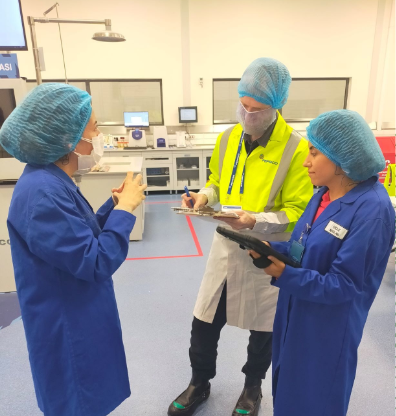PepsiCo Near Miss
Research, Service Design
PepsiCo were expanding a new Quality and Food safety program called ‘Near Miss’ to factory sites across the globe. This was a process designed for factories to help them ensure that PepsiCo were able to provide quality and safe products to customers. The program involved workers spotting and reporting events (Near Misses) that had potential to become incidents, before they became problems.
Over 7 months I worked as the service designer on a team conducting research across the globe. From this research, we helped design and implement this new process for Food safety in Africa, the Middle East and Central and Latin America.
*Some imagery has been redacted/witheld due to confidentiality commitments with PepsiCo
Ethnographic research in Manisa, Turkey
Ethnographic research in Izmir, Turkey
Phase 1:
My project team and I conducted ethnographic research at sites across the U.K, Spain and Turkey. Alongside this we undertook interviews with key stakeholders of the Near Miss process across Europe.
This informed the creation of personas for key stakeholders, as well as a Process Blueprint. We used this blueprint to highlight key touchpoints alongside pain points and opportunities
We presented this back to PepsiCo and received their sign-off to begin designing a pilot Near Miss programs in Africa, The Middle East and Central and Latin America.
Redacted Near Miss Programme Blueprint
Phase 2:
From the opportunities identified in this blueprint I worked directly with sites in Brazil, Egypt and South Africa to help site employees understand and engage with the new program.
It also involved the design of a digital process of capturing and recording Near Misses and channeling them into PepsiCo systems. PepsiCo’s ambition was for anyone in a site to be able to record a Near Miss, from senior management to an operator on a factory line. The process we refined helped this happen.
Training + Champions
In order to educate new sites on the Near Miss program, we decided to identify a group of Near Miss Champions. These Champions were significant figures at each of their sites when it came to Quality Control and Food Safety.
We provided them with Near Miss process training, Design Thinking training, and helped them tailor their approach to education and running the new program to the nuances of their own sites. We took an active role ensuring the champions took a user-centred approach to the Near Miss program, and considered how to empathise and help the different factions of stakeholders at their sites so that they could all report Near Misses.
Near Miss Forms
Once the Champions had led training at their sites, we encouraged them to begin testing the process by getting their workforce to submit real Near Misses.
I held workshops with the PepsiCo team to define the information that we wanted to capture about Near Miss incidents, before designing the form in digital and paper based versions. Sites began to test the process and make adjustments to their training and methods based on learnings - as per the Design Thinking training we provided
PepsiCo pilot site in Cairo
Near Miss Champion running through training with his team
Impact:
The Near Miss process is now live and running in South and Central America as well as Africa and the Middle East, based on the pilot programmes that we designed and developed.
A Near Miss submission in Sāo Paulo







